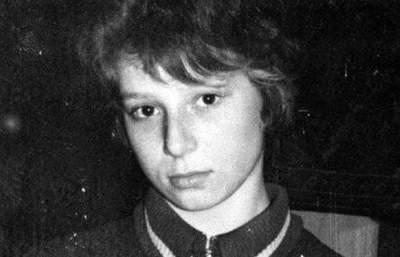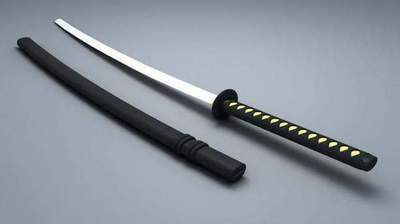Interesting facts about the Egyptian pharaohs
To the Egyptian kings were treated as a real living gods. They were the rulers of one of the first great civilizations, lived in luxury, and in their hands was hitherto incredible power for one person.
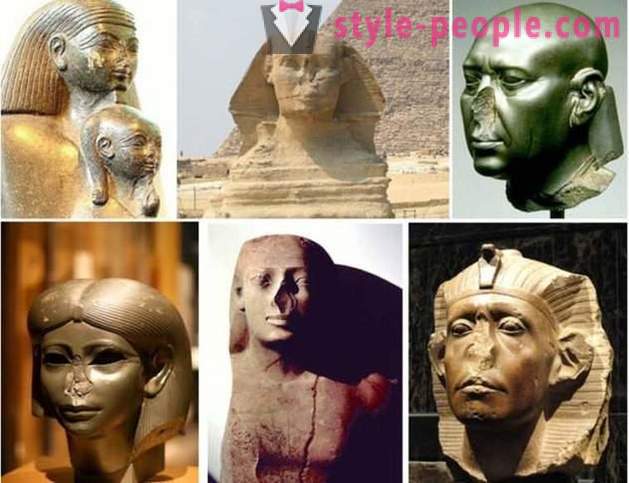
The Egyptian rulers lived happily ever after, until the whole hundreds or even thousands of people died during the construction of the magnificent pyramids and statues in their honor. And when do cops died, they were buried in huge tombs that hide their bodies from prying eyes almost 4000 years.
No one before had such absolute power and influence, and did not live in the history of mankind in such abundance, as the pharaohs. Sometimes it is very spoiled omnipotence of kings, which is quite surprising for an imperfect human nature.
10. Obsession pygmies and Pharaoh Pepi II of
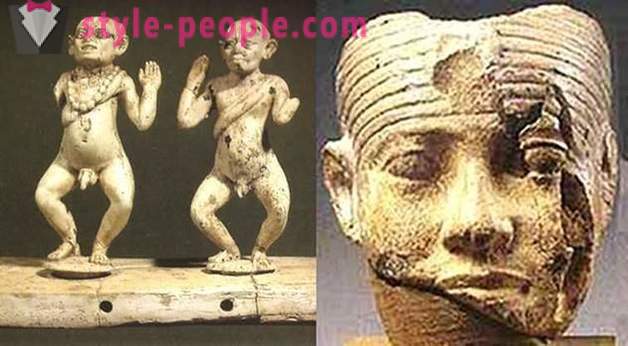
Pepi (Pepi) The second was about 6 years old when he became king of Egypt, that is, when he was appointed to rule the whole kingdom, he was just a little kid. Undoubtedly, in the hands of Pepi it has focused much more power than necessary to trust the 6-year-old silly.
It is not surprising that the young king and his childhood was a very spoiled child. Soon after his accession to the throne, Pepi was the researcher on behalf of Harkuf (Harkhuf) a letter in which he told the story of Pharaoh's meeting with dancing pygmy (undersized representative of the African people, inhabiting the equatorial forests). This message is so impressed and inspired Pharaoh, that he wanted to see the pygmy outlandish personally.
"Drop everything and come with him to my palace!" - wrote in response to Pepi. Child directed that nothing happened with Harkufom, and seriously took care of protection. "When you sit in a boat, gather trusted servants, and let them pygmy surrounded on all sides while walking the ramp, so that he in any case did not fall into the water! When a pygmy would go to sleep in his hammock, too, should lie to you loyal people around him. Every night, check it 10 times! "- strictly ordered Pharaoh. As a result, Pepi acquired his pygmy intact. Since childhood, he used to get all the desired and consider themselves far more important than anyone else on Earth. By the time he reached a more mature age, Pharaoh was already so spoiled and moody man, that even forced their slaves besmear oneself honey and walk around naked to Pepi did not disturb the flies.
9. Giant genital king Sesostris monuments
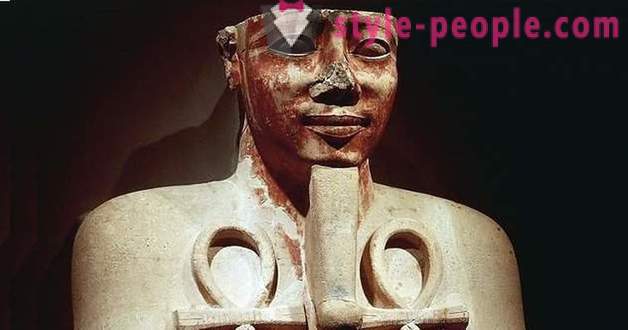
Sesostris (Sesostris) was one of the greatest military leaders in the history of Egypt. He sent warships and armies to the ends of the known world, and he distributed the Egyptian kingdom more than any of the other rulers of the empire. After each battle in honor of his success Sesostris installed huge columns depicting genitalia.
The king left these pillars in place all of their battles. Many of them were engraved texts about who he was, how he overcame his enemy, and about his belief in the divine approval of its invasion policy to all foreign lands.
In addition, Sesostris left these columns detail, which was designed to characterize the army defeated enemy. If the rivals were strong and fought with dignity, he added to the monument of the penis image. But if the enemy was weak, engraved on the monument appeared in the form of a vagina.
These columns were erected across the continent, and even lasted a long time. Even the famous Greek historian Herodotus saw several pillory Sesostris. 1500 years later, some of them were still in Syria, recalling the defeat of their ancestors.
8 washing urine and Pharaoh Feros
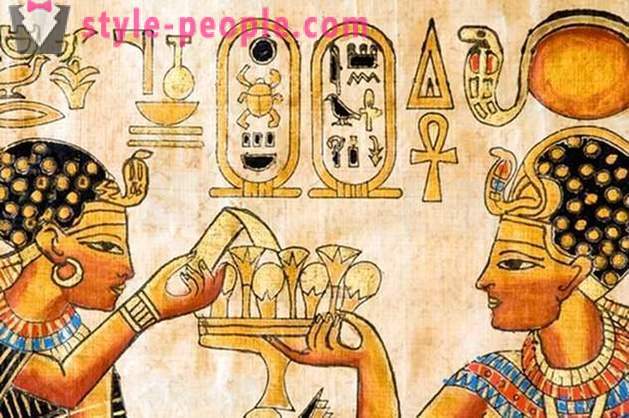
The son of Sesostris, Feros (Pheros), was blind. Perhaps it was a hereditary disease, but the official version of the Egyptian chronicles say that the heir to the throne cursed. According to legend, Neil began to flood the shores of the empire, and Feros angry that the river is causing damage to his kingdom. In a rage, he threw his spear into it. Pharaoh hoped so it pierces the bottom of the Nile and drain all the water, but it perturbed boldness gods curse ruler blindness. After 10 years, Oracle said Ferosu that his vision can be returned. All that is required - to wash the urine of a woman who has never slept with anyone except her husband.
Feros tried to wash the urine of his wife's eyes, but it did not help. He never saw the light, and his wife just throw up your hands, saying that it has not changed. Then Pharaoh summoned all women in the city, he ordered them all to take turns to go to the toilet in the same jar, and alternately poured its contents to your eyes.
It worked. A few dozen women Feros found most faithful Egyptian woman and healed. To celebrate, the king married the girl, and his former wife burned. At least, that's how the story goes. Although unlikely sight of Pharaoh rescued magic urine, and can be a story invented to justify his strange passion for women's urine.
7. A fake beard, Hatshepsut
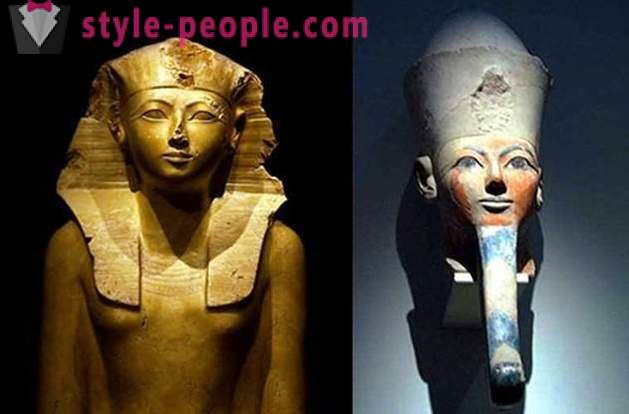
Hatshepsut (Hatshepsut) - it was one of the few women, awarded the reign of ancient Egypt. She had big plans for the empire, but on the way to the success of the queen had to overcome some obstacles. While Egypt even though he was much more advanced country than others, but there is no women were treated as equals, and so the queen was not easy.
To simplify the position, she even told his men that they always drew her man. Hatshepsut on all images should have been presented to the public with a muscular body and a beard. The queen called himself "Son of Ra" and presumably in humans, too, always wore a fake beard. It seemed to her that this simple slave and noble Egyptians will take it seriously.
Hatshepsut was able to accomplish a lot of good for his kingdom, and it is thought that much of the reason for this were her subterfuge and disguise a man. But in the end her son had done everything possible to erase the legacy of his mother in the history of the country, so that no one knew that Egypt was ruled by a woman. He did it so well that until 1903, no one suspected that Hatshepsut was a woman.
6. Poor king smelling diplomacy Amasis
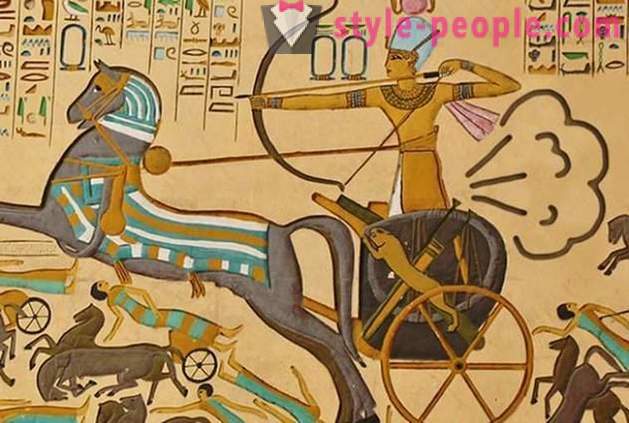
Amasis (Amasis) was not the most polite and well-mannered king in the history of ancient Egypt. He was not only an alcoholic, but also a kleptomaniac - Pharaoh stealing items belonging to their friends, and then convince them that it had never been their thing.
He got the throne by force. The former king of the empire had sent him to suppress the rebellion, but when Amasis arrived, he realized that the rebels are very good chances of winning. Then he decided to lead them, rather than to fulfill the legal order of the pharaoh. Amasis was not sophisticated diplomat, so he declared war on very rough - picked up the pace, farted, and said to the messenger, "Tell this to your king!".
All obscene habits of Amasis had their important implications. When he was just a kleptomaniac, Amasis sent to appear before the priests, so that they decide whether he is guilty or not. When Amasis became pharaoh, he punished all the visionaries who acquitted him earlier. The king thought that if the priests really talked with the gods, they would have had to know that he was a thief, and not let him escape from the court.
5. City Beznosov criminals and ruler Aktisanes
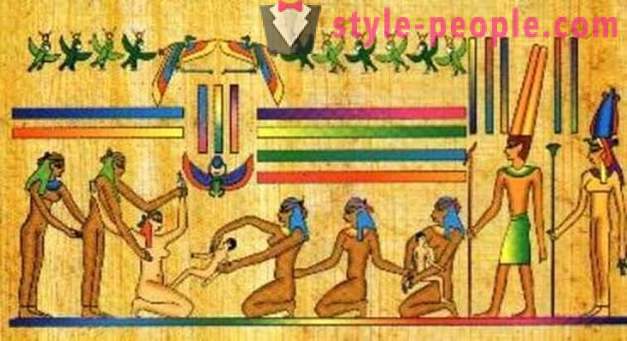
The people of Amasis could not long endure such a king. He was very rude and harsh Pharaoh, so soon he was deposed from the throne. At this time, the Egyptian revolution led by an Ethiopian named Aktisanes (Actisanes), who was going to rule much wiser and more merciful than his predecessor.
To the criminals he had his own approach. Anyone who has committed some crime, the executioners cut off his nose, and then the culprit was sent to live in the city Rinokolura (Rhinocolura), which literally is translated - a city cut off noses. There lived exclusively noseless criminals who had to survive in the harshest environments in the country. Water in Rinokolure was very dirty, and their homes crippled residents built of rubble fragments.
At first glance, it does not fit in with the promise of a new Pharaoh Amasis to be softer, but in the 6th century BC, it is in fact considered the top bounty against criminals. Romans wrote about Rinokoluru that this example is very good attitude Aktisanesa to his subordinates. In ancient times, if for a crime you cut off the nose, it is considered a great success.
4. 100 children of the king Ramses II of
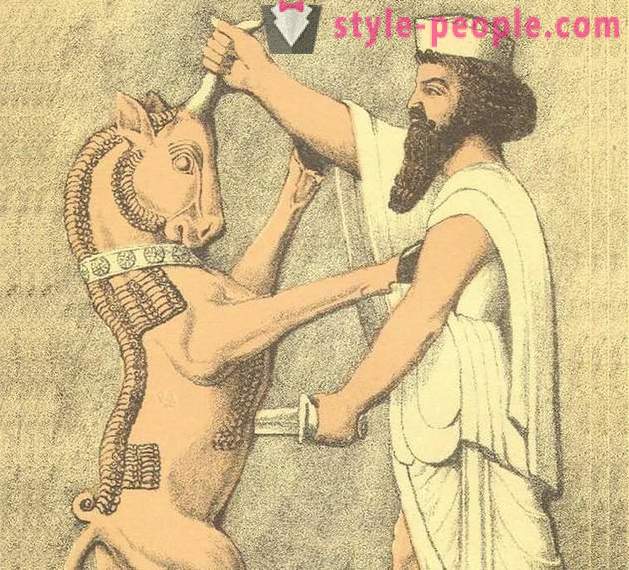
Ramses (Ramses) II lived for so long that people have even begun to worry that he will never die. At a time when most of the kings were killed during the first years of their reign, Ramses spent a lot of - 91 year. And all this time he had a good time. In all his life he not only built more statues and monuments, other than the king of Egypt, but also slept with more women than anyone else in the country.
To his great age at Ramses was not less than 100 children from 9 wives. To produce a much heirs to the bed need to spend a lot of time. Ramses married almost every girl, with whom he fell in love. When he invaded Hetskoe kingdom, Pharaoh refused to make peace with the rulers of this land, as they will not give him his eldest daughter. Nor did he hesitate to contact your eyes on your own daughters. Ramses married three of them, including their first child.
Perhaps these wives of Pharaoh was four. Historians are not sure whether there was Genutmir (Henutmire) his daughter or his sister, but since we are talking about Ramses II, makes no difference who she was before she became his wife.
3. Hate pharaoh Cambyses animals
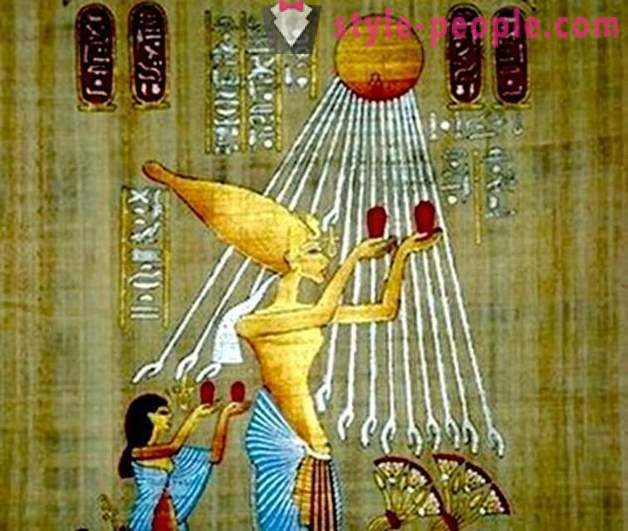
Cambyses (Cambyses) was not an Egyptian, Persian, and he was the son of Cyrus (Cyrus) the Great. After his people conquered Egypt, Cambyses put the head of the occupied land. During his reign he was particularly famous hatred for the animals.
Almost every story about the Egyptians of Cambyses There is a passage about the killing of a beast. At the beginning of his reign, the pharaoh went to visit Apis (Apis), the bull, which the Egyptians worshiped. Directly in front of the priests caring for a living deity, the king drew his dagger and began to beat them animal, laughing in the face of dignitaries with the words: "This is a god worthy of the Egyptians!".
It would not seem, but the cause of the murder of the unfortunate ox was not his attitude to the Egyptians. In fact, the son of Cyrus just liked to look at the suffering of animals. In the days of his power Cambyses arranged fights between the cubs and pups, and forced his wife to look like animals tearing each other apart.
2. City Akenatena king, built on the broken backs of

Akenaten (Akhenaten) completely changed Egypt. Before he took the throne, the Egyptians had many gods, but Akenaten prohibited polytheism and left only one idol - Aten, the sun god. This meant a major change in the life of Egypt, on the implementation of which took a lot of effort. So much, that Pharaoh had tired his people literally to death.
In honor of the one God Aten Akenaten king he built a new city - Amarna (Amarna). Pharaoh has driven to the construction of 20 000 people, and it did not matter at what price they will be given to participate in this mission and how they will feel. Accidents Egyptians had to bear all the load or die. Based on the analysis of bones from the town cemetery, archaeologists have concluded that more than two-thirds of the dead are the workers broke bones, and the whole third of them was broken spine. People are very poorly fed. Almost every resident of the new city was exhausted, and no one was allowed to take medication or rest too long. If someone breaks the rules, trying to snatch a piece of food once or lazy, disobedient slave sentenced to death and stabbed with a knife.
All the suffering of the Egyptians were a vain sacrifice, because immediately after the death Akenatena all his undertakings were destroyed, and his infamous name was almost erased from Egyptian history.
1. Refusal Pharaoh Menkura die
Even Pharaoh dies. Although the great names of the Egyptian kings were always accompanied by the title of "eternal" or "immortal" every ruler knew he would come, and his turn to leave this world. They built for themselves a pyramid, to comfortably spend the afterlife, yet each of the Pharaohs once had doubts about what would happen to a person after his eyelids closed, in the last time.
Menakur (Menkaure), the pharaoh who ruled in the 26th century BC, just questioned what would happen after his death. When it came to the oracle, and said that the king left to live only 6 years old, he was struck to the heart, and plunged into a true horror. Menakur did everything possible to avoid death.
One day he decided that he could outwit the gods. Pharaoh thought: if the night would never come, will come, and a new day, and if the next day will not come, the time will not be able to move forward, and this means that Menakur not die. So he lit every night as many lamps and candles, and told himself that extends daylight. For the rest of his life the night the king had not slept much, spending time with the man-made light fixtures, drinking alcohol and having fun until the morning, at the same time afraid that is about to come a moment when "goes out of his candle."

































